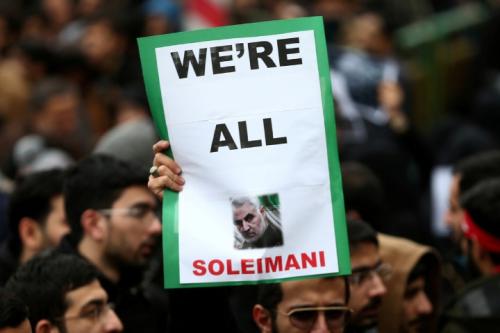



Iran listed the Pentagon, the military command headquarters of the United States, as terrorist organization on Tuesday. It was another step to combat a series of hostile US actions and threats, including the killing of a top Iranian military commander and the targeting of cultural sites.
Lawmakers in Iran announced that the country would blacklist the US Department of Defense, all affiliated institutions and companies, and the commanders "who planned and perpetrated the assassination" of senior general Qasem Soleimani, the official IRNA news agency reported.
"Any aid to these forces, including military, intelligence, financial, technical, service or logistical, will be considered as cooperation in a terrorist act," the lawmakers said.
They also voted to bolster by 200 million euros ($223 million) the coffers of the Quds Force, the foreign operations arm of Iran's Islamic Revolutionary Guards Corps, which was headed by Soleimani. The general was killed in a US drone strike outside the Baghdad airport on Friday.
The bill condemning the Pentagon was an amended version of a law adopted in April last year that declared the US a "state sponsor of terrorism" and its forces in the region "terror groups".
After the vote, the lawmakers chanted "Death to America" and called for revenge, Iran's Press TV reported. It also cited the secretary of Iran's Supreme National Security Council, Ali Shamkhani, saying that 13 revenge scenarios had already been drafted, the weakest of which would be a nightmare for the US.
Concerning the escalation of tensions in the Gulf region, Zhang Jun, China's permanent representative to the United Nations, said on Monday that China had been following the situation very closely and that the pressing task at the moment is "to prevent the situation from further escalating and running out of control".
Zhang called for the international community, including the UN Security Council, to make efforts to de-escalate tensions.
"China is ready to keep close communication with relevant parties, uphold just and objective positions, stand for international law, fairness and justice, and maintain peace and stability in the Gulf region and the Middle East," he said.
Also on Monday, the US denied a visa to Iranian Foreign Minister Mohammad Javad Zarif that would have allowed him to attend a United Nations Security Council meeting in New York on Thursday, according to a US official who spoke on condition of anonymity.
Zarif, speaking in Teheran, said: "They fear that someone will come to the US and reveal reality."
The US State Department has not commented on Zarif's visa request. As host of the UN headquarters, the US is supposed to allow foreign officials to attend such meetings.
Meanwhile, in Washington, US Secretary of Defense Mike Pompeo suggested that the US military would not strike Iranian cultural sites and would "follow the laws of armed conflict" because targeting such sites would be a war crime.
US President Donald Trump tweeted on Saturday night that sites "important to Iran & the Iranian culture" were on a list of 52 potential US targets if Iran hit back following the death of Soleimani a day earlier.
In Russia, the Foreign Ministry said on Monday that Moscow remains fully committed to the nuclear deal even after Iran announced it would reduce its obligations under the accord.
The ministry said in a statement that Iran's decision is a consequence of contradictions accumulated within the agreement, but Russia is still "ready to continue working in order to achieve them" and urged other participants to do the same.
"We do not see any other effective recipe to rescue the nuclear deal. We assume that keeping comprehensive agreements and provisions ... will remain a priority task for all partners," the ministry said.
The Iranian cabinet said on Sunday that the country would "take the final step to reduce commitments" to the nuclear deal and would not observe restrictions in operations.
So far, Russia sees no threat of nuclear weapons proliferation after Iran's announcement, the ministry said.
"Iran is carrying on all its activities in close cooperation and under ongoing control by International Atomic Energy Agency," the Russian ministry said.
Amid the tensions, Japanese Prime Minister Shinzo Abe announced on Tuesday that he would visit Saudi Arabia, Oman and the United Arab Emirates next week.
"I'm deeply concerned about the tensions in the Middle East," he said. "I hope to contribute to peace and stability in the region through diplomatic efforts."
Abe has tried in recent months to carve out a role as a mediator between the US and Iran. Tokyo has had ties with Teheran for decades.
Zhao Huanxin in Washington, Hong Xiao at the United Nations, Ren Qi in Moscow, AFP and Xinhua contributed to this story.
If you have any problems with this article, please contact us at app@chinadaily.com.cn and we'll immediately get back to you.